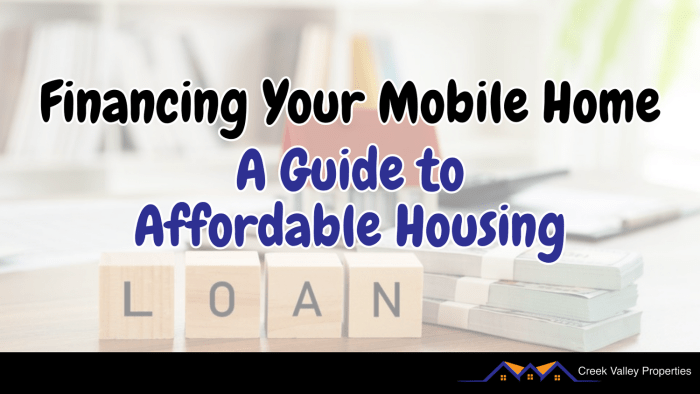7 Mobile Home Financing Options You Need to Consider: Aduh, beli rumah mobile, kayak beli gorengan aja? Eits, jangan salah! Mungkin keliatan gampang, tapi urusan duitnya? Ribet juga, cuy! Dari mulai chattel mortgage yang kayak pinjem uang buat beli motor, sampe rent-to-own yang ‘ngontrak’ dulu baru beli. Kita bahas tuntas, biar gak keselek nanti pas bayar cicilannya!
This guide unravels the seven key financing options for your mobile home purchase, breaking down the jargon and highlighting the pros and cons of each. We’ll explore traditional mortgages, land loans, personal loans, home equity options, seller financing, and rent-to-own agreements. Think of it as your trusty ‘jagoan’ navigating the often-confusing world of mobile home financing.
Prepare to be amazed (and maybe a little less stressed!).
Understanding Mobile Home Financing
Owning a mobile home presents a unique pathway to homeownership, often more accessible than traditional houses. However, financing a mobile home differs significantly from securing a mortgage for a site-built home. Understanding these differences is crucial for making informed financial decisions and achieving your homeownership goals. This knowledge empowers you to navigate the process confidently and choose the financing option best suited to your individual circumstances.Mobile home financing encompasses two key aspects: financing the home itself and financing the land on which it sits.
These are often separate transactions, requiring different loan types and potentially different lenders. Financing the mobile home typically involves a chattel loan, treating the home as personal property. Land financing, on the other hand, is more akin to a traditional mortgage, securing the loan against the real estate. Failing to grasp this distinction can lead to complications and potentially higher costs.
Let’s delve into the intricacies of this process.
Mobile Home Financing Process Steps
The mobile home financing process involves several key steps, each requiring careful attention to detail. A thorough understanding of these steps will significantly reduce stress and ensure a smoother transaction. This is not a simple process, and professional guidance is often beneficial.
- Credit Check and Pre-Approval: Before you even start looking at mobile homes, it’s vital to get pre-approved for a loan. This involves a credit check to determine your creditworthiness and the loan amount you qualify for. This step provides you with a realistic budget and empowers you to shop confidently.
- Finding a Mobile Home and Land: Once pre-approved, you can begin your search for the perfect mobile home and suitable land. Remember, you might need separate financing for each. Careful consideration of location, size, and features is essential at this stage.
- Loan Application and Appraisal: After selecting your mobile home and land (if purchasing land separately), you’ll formally apply for the loan(s). The lender will conduct an appraisal to determine the value of the home and land, ensuring the loan amount aligns with the asset’s worth.
- Loan Closing and Funding: Once the appraisal is complete and all documentation is in order, the loan closes. This involves signing legal documents and receiving the funds to purchase your mobile home and land. This is the final step before you can move into your new home.
Financing the Mobile Home (Chattel Loan)
A chattel loan is used to finance the purchase of the mobile home itself. Unlike a mortgage, a chattel loan considers the mobile home as personal property, not real estate. This means the loan terms and interest rates may differ from traditional mortgages. Interest rates on chattel loans can be higher than those for mortgages due to the perceived higher risk associated with personal property.
However, with good credit and a strong financial history, you can secure competitive rates.
Financing the Land (Mortgage)
Financing the land usually involves a traditional mortgage. This process is similar to obtaining a mortgage for a site-built home, requiring a credit check, appraisal, and loan application. The lender will assess your creditworthiness and the value of the land to determine the loan amount and interest rate. Because land is considered real estate, the interest rates are often lower than those for chattel loans.
However, obtaining a mortgage for land might be more challenging if you haven’t secured financing for the mobile home first.
Traditional Mortgages for Mobile Homes (Chattel Loans)
Securing financing for your mobile home doesn’t always follow the same path as financing a traditional site-built house. One crucial avenue is the chattel mortgage, a financing option specifically designed for mobile homes. Understanding its nuances is key to making an informed decision about your home purchase. Let’s delve into the specifics of this important financing tool.Chattel mortgages are a type of loan that finances the purchase of personal property, in this case, your mobile home.
Unlike a traditional mortgage, which secures the loan against the land and the house, a chattel mortgage only secures the loan against the mobile home itself. This means that if you default on the loan, the lender can repossess the mobile home, but they do not have claim to the land on which it sits.
Chattel Mortgage Characteristics
A chattel mortgage typically covers the purchase price of the mobile home, including any applicable sales taxes and fees. Loan terms generally range from 10 to 20 years, although shorter or longer terms may be available depending on the lender and your financial situation. Interest rates vary considerably based on your credit score, the loan amount, and prevailing market conditions.
Down payment requirements also vary widely; some lenders may require a substantial down payment, while others may offer financing with little or no money down. It is vital to shop around and compare offers from multiple lenders to secure the best terms.
Comparison with Site-Built Home Mortgages
The key difference between a chattel mortgage and a traditional mortgage for a site-built home lies in the collateral. A traditional mortgage uses both the land and the house as collateral, while a chattel mortgage only uses the mobile home. This difference can have significant implications in case of default. With a traditional mortgage, the lender can repossess both the house and the land.
With a chattel mortgage, only the mobile home is at risk. Furthermore, traditional mortgages often come with longer repayment terms and potentially lower interest rates due to the greater value and stability of the underlying asset.
Advantages and Disadvantages of Chattel Mortgages
Chattel mortgages can offer several advantages. For instance, they can be easier to obtain than traditional mortgages, particularly for individuals with less-than-perfect credit. They can also be a good option for those who plan to move their mobile home in the future, as the financing remains tied to the home itself. However, disadvantages include potentially higher interest rates compared to traditional mortgages and the limited collateral, meaning the lender’s recourse is limited to the mobile home in case of default.
The risk of repossession is a significant consideration.
Chattel Mortgage Lender Comparison
The following table provides a hypothetical comparison of interest rates, loan terms, and down payment requirements from different lenders. Remember that these are examples only and actual rates and terms will vary depending on your individual circumstances and the lender’s policies. Always verify current rates and terms directly with the lenders.
| Lender | Interest Rate (APR) | Loan Term (Years) | Down Payment Requirement |
|---|---|---|---|
| Lender A | 7.5% | 15 | 10% |
| Lender B | 8.2% | 12 | 5% |
| Lender C | 9.0% | 20 | 0% |
| Lender D | 6.8% | 18 | 20% |
Land Loans
Owning the land beneath your mobile home is a crucial step towards building long-term equity and stability. While a chattel loan covers the mobile home itself, securing a separate land loan provides a distinct financial advantage and protects your investment. Let’s explore the world of land loans and how they can benefit you.Land loans are specifically designed to finance the purchase of land, often a prerequisite for placing a mobile home.
Unlike chattel loans that focus solely on the mobile home as personal property, land loans treat the land as real estate, offering different terms and benefits. Understanding these distinctions is vital for making informed financial decisions.
Types of Land Loans and Suitability
Several types of land loans cater to diverse financial situations and property types. These include conventional loans, FHA loans, and potentially USDA loans depending on location and eligibility. Conventional loans typically require a higher credit score and down payment, offering competitive interest rates. FHA loans are more accessible to borrowers with lower credit scores, but may involve mortgage insurance premiums.
USDA loans might be an option for rural properties, offering attractive terms for eligible applicants. The best type of land loan for you will depend on your creditworthiness, the location of the land, and the amount of your down payment.
Interest Rates and Loan Terms Compared to Chattel Mortgages
Land loan interest rates and terms generally differ from chattel mortgages. Land loans, being secured by real estate, often command lower interest rates due to the lower risk for lenders. The loan terms are also typically longer, potentially spanning 15 to 30 years, compared to the shorter terms often associated with chattel mortgages. However, the specific rates and terms will vary significantly depending on your credit score, the lender, and the prevailing market conditions.
For example, a conventional land loan might offer a 30-year term at a 6% interest rate, while a chattel mortgage for the same borrower might have a 15-year term at 7%. This illustrates the potential savings and long-term financial benefits of a land loan.
Situations Where a Land Loan is Necessary or Advantageous
Several scenarios highlight the importance of securing a land loan. Consider the situation of a mobile home owner who initially rents the land. A land loan allows them to purchase the land outright, eliminating rent payments and building equity. Another example is when buying land to place a new mobile home. A land loan provides the necessary capital for land acquisition, enabling the purchase of a suitable lot.
Furthermore, owning the land increases the overall value of your property, providing a more secure investment and potential for appreciation. This enhanced equity can be leveraged in the future for refinancing or other financial opportunities.
Personal Loans
Securing your dream mobile home shouldn’t be a distant dream. Sometimes, bridging the gap between your savings and the total cost requires a strategic approach. Personal loans can serve as a powerful tool in this journey, offering a flexible path to cover down payments, closing costs, or even unexpected expenses that arise during the purchasing process. Let’s explore how personal loans can be a valuable part of your mobile home financing strategy.Personal loans offer a distinct advantage in mobile home financing by providing a readily accessible source of funds for upfront costs.
These loans are unsecured, meaning they don’t require collateral, making them relatively easier to obtain compared to other loan types. This flexibility can be crucial when facing tight deadlines or unexpected financial hurdles during the home-buying process. However, it’s essential to understand both the benefits and drawbacks before leveraging a personal loan for this purpose.
Personal Loan Benefits and Risks in Mobile Home Financing
Utilizing a personal loan for a mobile home purchase presents both opportunities and challenges. On the plus side, the speed and accessibility of personal loans can be invaluable, especially when dealing with time-sensitive closing dates. Furthermore, personal loans can provide the necessary funds to secure a better interest rate on a larger, more favorable mortgage by allowing for a larger down payment.
Conversely, personal loans often carry higher interest rates than dedicated mobile home loans, leading to increased overall borrowing costs. Careful budgeting and comparison shopping are essential to mitigate this risk. Also, adding another loan to your financial profile could potentially impact your credit score, particularly if not managed effectively.
Comparison of Interest Rates and Repayment Terms
Interest rates and repayment terms for personal loans vary significantly depending on factors such as your credit score, the loan amount, and the lender. Generally, personal loans have higher interest rates than dedicated mobile home loans or traditional mortgages. For example, a personal loan might carry an interest rate of 10-15%, while a mobile home loan could range from 6-12%, depending on the borrower’s creditworthiness and market conditions.
Repayment terms are also typically shorter for personal loans, often ranging from 2 to 5 years, compared to the longer terms (15-30 years) commonly associated with mortgages. This shorter repayment period leads to higher monthly payments, which must be factored into your overall budget.
Scenario: Supplementing Other Financing
Imagine you’ve secured a mortgage for your mobile home, but you’re still short $5,000 for the down payment and closing costs. Instead of delaying the purchase or compromising on your dream home, you could take out a personal loan for this amount. This supplemental loan would allow you to proceed with the purchase, using the mortgage to cover the bulk of the cost while the personal loan bridges the remaining financial gap.
Remember to meticulously compare interest rates and repayment terms from multiple lenders to secure the most favorable personal loan option. This strategic approach demonstrates how a personal loan can serve as a valuable tool to supplement other financing options, allowing you to achieve your mobile home ownership goals.
Home Equity Loans/Lines of Credit
Unlocking the equity in your mobile home offers a powerful avenue for financing improvements and upgrades. Home equity loans and lines of credit leverage the value you’ve already built, providing access to funds for those essential renovations or exciting additions that enhance your living space and increase your property’s overall value. Let’s explore how this financing option can work for you.Home equity loans and lines of credit use your mobile home’s equity as collateral.
This means the lender uses the difference between your mobile home’s market value and the amount you still owe on any existing loan as security for the new loan. This equity acts as a safety net for the lender, often leading to more favorable interest rates compared to other financing options. This strategy allows you to tap into the financial gains you’ve already accumulated, reinvesting in your property to reap even greater long-term benefits.
Home Equity Loan Usage for Mobile Home Improvements, 7 Mobile Home Financing Options You Need to Consider
Home equity loans provide a lump sum of money upfront. This is ideal for significant projects like a complete kitchen remodel, the addition of a sunroom, or substantial upgrades to your plumbing or electrical systems. You receive the full amount at once and repay it according to a fixed schedule, similar to a traditional mortgage. This predictability makes budgeting for repayment straightforward and manageable.
For example, a homeowner might use a $20,000 home equity loan to replace their aging HVAC system and install new energy-efficient windows, substantially improving their comfort and reducing their energy bills over time.
Home Equity Line of Credit (HELOC) Usage for Mobile Home Improvements
A HELOC, on the other hand, works more like a credit card. It provides a line of credit you can borrow against as needed, up to a pre-approved limit. This flexibility is advantageous for smaller, ongoing projects or for unexpected repairs. You only pay interest on the amount you borrow, making it a cost-effective choice for managing smaller, intermittent upgrades.
A homeowner might use a HELOC to fund the gradual replacement of appliances, one at a time, or to cover unexpected roof repairs. The flexibility allows them to manage expenses more effectively.
Requirements for Securing a Home Equity Loan or HELOC for a Mobile Home
Securing a home equity loan or HELOC for a mobile home often involves similar requirements to traditional mortgages. Lenders typically assess your credit score, debt-to-income ratio, and the appraised value of your mobile home. They’ll want to ensure you have sufficient equity and a consistent income to comfortably manage the repayments. The specific requirements vary between lenders, so it’s crucial to shop around and compare offers.
Providing thorough documentation, such as proof of income and homeownership, is essential in the application process. Furthermore, the age and condition of your mobile home can influence the lender’s decision, with newer, well-maintained homes often securing more favorable terms.
Interest Rates and Repayment Terms Compared to Other Options
Interest rates for home equity loans and HELOCs are generally lower than those for personal loans or credit cards. However, they may be slightly higher than traditional mortgages due to the higher risk associated with using the home as collateral. Repayment terms are typically longer than personal loans, but shorter than traditional mortgages, allowing for a balance between affordability and timely repayment.
The exact terms depend on your creditworthiness, the loan amount, and the lender’s policies. For instance, a home equity loan might offer a fixed interest rate over 10-15 years, while a HELOC could offer a variable interest rate with a draw period of 10 years followed by a repayment period.
Key Differences Between Home Equity Loans and Home Equity Lines of Credit
Understanding the core differences between these two options is crucial for making an informed decision. Here’s a comparison:
- Loan Type: Home equity loans provide a lump sum; HELOCs provide a revolving line of credit.
- Access to Funds: Home equity loans offer immediate access to the full amount; HELOCs allow you to borrow as needed up to your credit limit.
- Repayment: Home equity loans have fixed monthly payments over a set term; HELOCs have variable monthly payments based on your borrowing and the interest rate.
- Interest Rates: Home equity loans typically have fixed interest rates; HELOCs often have variable interest rates.
- Flexibility: Home equity loans are less flexible; HELOCs offer greater flexibility for managing expenses over time.
Seller Financing
Seller financing presents a unique pathway to mobile home ownership, offering a compelling alternative to traditional lending institutions. It involves the current homeowner directly financing the sale of their mobile home to a buyer, essentially acting as the bank. This arrangement can be particularly beneficial in situations where securing a conventional loan proves challenging. Let’s explore the intricacies of this option.Seller financing offers a win-win scenario, potentially, but it’s crucial to understand both the advantages and disadvantages for both parties involved.
Careful consideration and clear communication are key to a successful transaction.
Advantages and Disadvantages for Buyers
For buyers, seller financing can open doors to homeownership that might otherwise remain closed. The lower credit score requirements and more flexible approval process can be particularly appealing to those with less-than-perfect credit histories. However, it’s essential to weigh the potential drawbacks, such as higher interest rates compared to conventional loans and the potential for increased risk if the seller is not a reputable financial entity.
Advantages and Disadvantages for Sellers
From the seller’s perspective, seller financing can offer a quicker sale and potentially a higher return than a traditional sale. The seller receives a steady stream of payments, rather than a single lump sum, potentially providing a more predictable income stream. However, seller financing exposes the seller to the risk of default by the buyer, requiring careful vetting of the buyer’s financial stability and a well-structured contract to mitigate this risk.
Additionally, the seller may forgo the immediate cash benefit of a traditional sale.
Situations Where Seller Financing is Viable
Seller financing can be a viable option in several scenarios. For example, a buyer with a lower credit score might struggle to secure a traditional loan but could qualify for seller financing due to the seller’s personal assessment of their financial reliability. Similarly, in a slow real estate market, seller financing can attract buyers, leading to a faster sale for the seller.
Another instance might be when the buyer has a substantial down payment but lacks the credit history to secure a bank loan.
Typical Terms and Conditions in Seller Financing Agreements
Seller financing agreements typically involve detailed terms and conditions. These include the purchase price, down payment amount, interest rate (which can be significantly higher than conventional loans), payment schedule (monthly, quarterly, or annual), and the length of the loan term. The agreement should also clearly Artikel the consequences of default by the buyer, including potential foreclosure procedures. It is strongly recommended that both parties seek independent legal counsel before signing any such agreement to ensure the contract is fair and protects the interests of both the buyer and the seller.
The agreement should also specify any prepayment penalties that may apply if the buyer pays off the loan early. A detailed amortization schedule, outlining the principal and interest portions of each payment, is also a standard component.
Rent-to-Own Agreements
Rent-to-own agreements, also known as lease-to-own options, present a unique pathway to mobile home ownership. They offer a potentially less stringent qualification process than traditional financing, making homeownership accessible to individuals who might otherwise struggle to secure a mortgage. However, it’s crucial to understand the intricacies and potential pitfalls before embarking on this path. This financing method blends renting and buying, allowing you to live in the mobile home while making payments that gradually build equity towards eventual ownership.Rent-to-own agreements function by structuring a lease agreement with an option to purchase the mobile home at a predetermined price after a specified period.
Monthly payments are typically higher than a standard rental payment, as a portion of each payment is allocated towards the eventual purchase price. A significant portion of the initial payments might be applied to the purchase price rather than rent, making this method more akin to a financing plan. The agreement will clearly define the purchase price, the length of the lease-purchase period, the amount of rent versus equity build-up in each payment, and the conditions under which the buyer can exercise their option to purchase.
Failure to meet the terms of the agreement could result in the loss of any equity built up during the lease period.
Mechanics of Rent-to-Own Agreements
A rent-to-own agreement for a mobile home typically involves a contract between the buyer and the seller. This contract details the monthly rent payment, the option price (the price at which the buyer can purchase the home at the end of the lease term), and the length of the lease-purchase period, usually ranging from a few years to a decade.
The contract also Artikels the conditions for default, such as missed payments, and the consequences of such defaults, which could include forfeiture of the equity built up. Crucially, the contract will specify how much of each monthly payment is applied towards rent and how much towards the eventual purchase price. This breakdown is vital for understanding the true cost of the arrangement.
A reputable seller will provide a transparent and easily understandable contract.
Risks and Benefits for Buyers
Rent-to-own agreements present both advantages and disadvantages for buyers. One significant benefit is the opportunity to build equity gradually while living in the home. Another advantage is that it can be easier to qualify for than a traditional mortgage, particularly for individuals with credit challenges. However, the risks are substantial. Buyers may end up paying significantly more for the mobile home than its market value due to the built-in profit margin for the seller.
Furthermore, if the buyer defaults on payments, they could lose all payments made towards the purchase price. It is also crucial to carefully examine the purchase price at the end of the lease term, as it may not reflect the actual market value of the mobile home. Buyers should have the home professionally appraised to ensure the purchase price is fair.
Risks and Benefits for Sellers
For sellers, a rent-to-own agreement offers a potential way to sell a mobile home that might otherwise be difficult to sell on the open market. They can receive a steady stream of income while the buyer gradually builds equity. However, the seller bears the risk of the buyer defaulting on payments, leaving the seller with the responsibility of repossessing the property and potentially incurring legal costs.
There is also the risk that the market value of the mobile home could decline during the lease period, impacting the final sale price. It’s vital for sellers to ensure the buyer has a reasonable chance of completing the purchase and to carefully structure the agreement to protect their interests.
Cost Comparison with Traditional Financing
Compared to traditional mortgages, rent-to-own agreements often result in a higher overall cost. The interest rate implied in a rent-to-own agreement is usually significantly higher than that of a mortgage. The seller’s profit margin is factored into the final purchase price, leading to a potentially inflated cost. Traditional financing options like chattel mortgages or land loans, while requiring a more rigorous qualification process, usually offer more favorable interest rates and overall lower costs.
A careful comparison of total costs over the life of the agreement is essential before committing to a rent-to-own arrangement.
Hypothetical Example
Let’s imagine a mobile home priced at $50,000. In a rent-to-own scenario, the buyer might agree to a five-year lease with monthly payments of $1,200, with $600 allocated to rent and $600 to the purchase price. After five years, the buyer would have paid $36,000 towards the purchase price. However, the final purchase price could still be $50,000 or even higher, meaning the buyer needs to pay an additional $14,000 upfront.
If the same home were financed through a traditional mortgage with a 6% interest rate over 15 years, the monthly payment would likely be lower, and the total cost of the loan, including interest, would likely be less than the rent-to-own scenario. This highlights the potential for higher overall costs with rent-to-own agreements.
Ultimate Conclusion

So, there you have it! Seven paths to owning your mobile home, each with its own unique flavor. From the straightforward chattel mortgage to the more adventurous rent-to-own, the choice is yours. Remember, ‘hati-hati’ is key – do your research, compare options, and don’t be afraid to ask questions. Good luck, and may your mobile home journey be smooth sailing (or at least, less bumpy than a Jakarta street!).
Expert Answers: 7 Mobile Home Financing Options You Need To Consider
What’s the difference between financing the mobile home and the land?
Financing the mobile home (chattel loan) is like financing a car; you’re buying the house itself. A land loan is separate and covers the land where the home sits. You usually need both.
Can I use a mobile home as collateral for a loan?
Yes, but it depends on the lender and the type of loan. A chattel mortgage uses the mobile home as collateral. Home equity loans might also use it, depending on the value.
What if my credit score isn’t perfect?
Don’t panik! While a good credit score helps, some lenders offer options for those with less-than-perfect credit. You might face higher interest rates, though. Shop around!
How long does the mobile home financing process take?
It varies, but expect it to take several weeks to a few months, depending on the lender and your situation. Be patient, ya!
Are there any government programs to help with mobile home financing?
Potentially! Check with your local housing authorities or government websites for programs that may assist with down payments or interest rates. It’s worth looking into!




